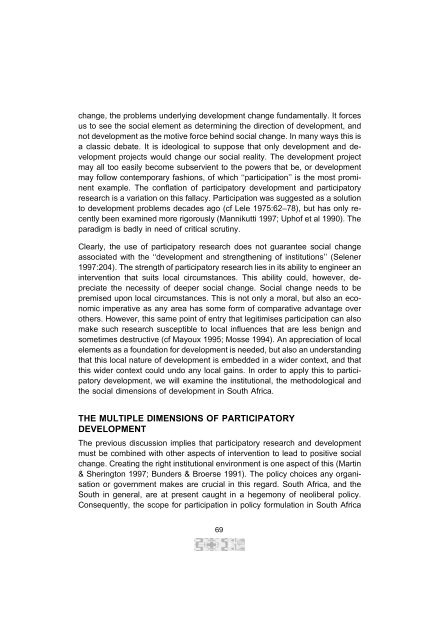AFRICANUS Vol 30 No 2 ISSN 0304-615X - University of South Africa
AFRICANUS Vol 30 No 2 ISSN 0304-615X - University of South Africa
AFRICANUS Vol 30 No 2 ISSN 0304-615X - University of South Africa
You also want an ePaper? Increase the reach of your titles
YUMPU automatically turns print PDFs into web optimized ePapers that Google loves.
change, the problems underlying development change fundamentally. It forces<br />
us to see the social element as determining the direction <strong>of</strong> development, and<br />
not development as the motive force behind social change. In many ways this is<br />
a classic debate. It is ideological to suppose that only development and development<br />
projects would change our social reality. The development project<br />
may all too easily become subservient to the powers that be, or development<br />
may follow contemporary fashions, <strong>of</strong> which ``participation'' is the most prominent<br />
example. The conflation <strong>of</strong> participatory development and participatory<br />
research is a variation on this fallacy. Participation was suggested as a solution<br />
to development problems decades ago (cf Lele 1975:62±78), but has only recently<br />
been examined more rigorously (Mannikutti 1997; Uph<strong>of</strong> et al 1990). The<br />
paradigm is badly in need <strong>of</strong> critical scrutiny.<br />
Clearly, the use <strong>of</strong> participatory research does not guarantee social change<br />
associated with the ``development and strengthening <strong>of</strong> institutions'' (Selener<br />
1997:204). The strength <strong>of</strong> participatory research lies in its ability to engineer an<br />
intervention that suits local circumstances. This ability could, however, depreciate<br />
the necessity <strong>of</strong> deeper social change. Social change needs to be<br />
premised upon local circumstances. This is not only a moral, but also an economic<br />
imperative as any area has some form <strong>of</strong> comparative advantage over<br />
others. However, this same point <strong>of</strong> entry that legitimises participation can also<br />
make such research susceptible to local influences that are less benign and<br />
sometimes destructive (cf Mayoux 1995; Mosse 1994). An appreciation <strong>of</strong> local<br />
elements as a foundation for development is needed, but also an understanding<br />
that this local nature <strong>of</strong> development is embedded in a wider context, and that<br />
this wider context could undo any local gains. In order to apply this to participatory<br />
development, we will examine the institutional, the methodological and<br />
the social dimensions <strong>of</strong> development in <strong>South</strong> <strong>Africa</strong>.<br />
THE MULTIPLE DIMENSIONS OF PARTICIPATORY<br />
DEVELOPMENT<br />
The previous discussion implies that participatory research and development<br />
must be combined with other aspects <strong>of</strong> intervention to lead to positive social<br />
change. Creating the right institutional environment is one aspect <strong>of</strong> this (Martin<br />
& Sherington 1997; Bunders & Broerse 1991). The policy choices any organisation<br />
or government makes are crucial in this regard. <strong>South</strong> <strong>Africa</strong>, and the<br />
<strong>South</strong> in general, are at present caught in a hegemony <strong>of</strong> neoliberal policy.<br />
Consequently, the scope for participation in policy formulation in <strong>South</strong> <strong>Africa</strong><br />
69
















